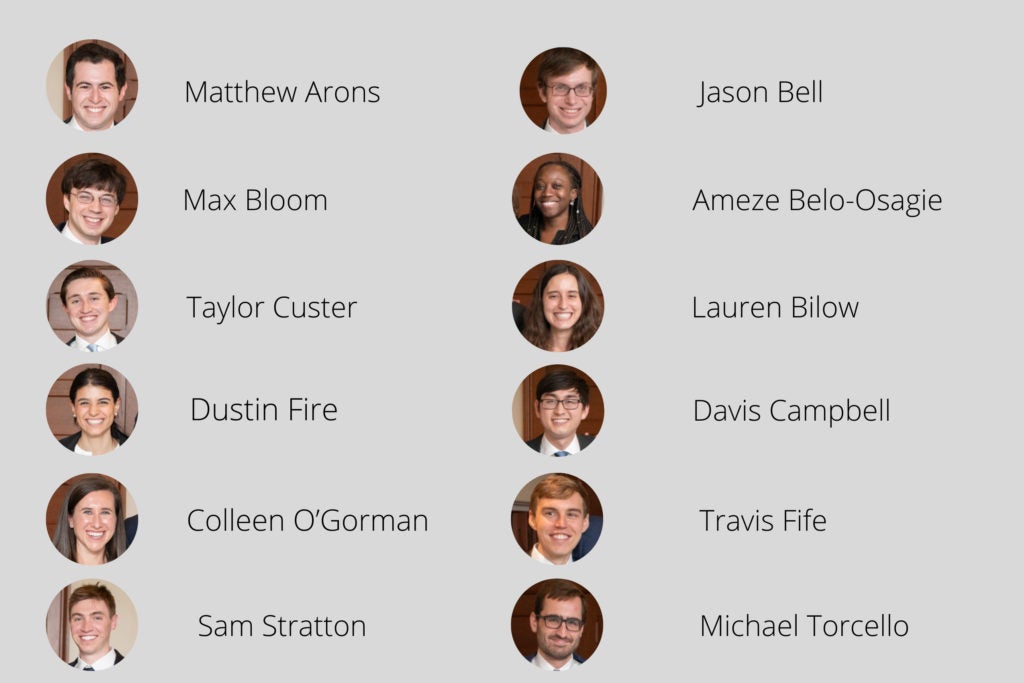For more than a century Harvard Law School’s Ames Moot Court Competition has been one of the most prestigious competitions for appellate brief writing and advocacy in the nation.
The Final Round of Ames, with two teams of third-year students arguing their case before an illustrious panel of distinguished jurists — often including a justice of the U.S. Supreme Court — is one of the most anticipated events of the year at Harvard Law School.
This year, for the first time in its 110-year history, the competition will be conducted virtually, due to the ongoing coronavirus pandemic.
On March 10, finalists and judges will be “Zooming in” from their homes for the virtual competition.
The event will be livestreamed so that classmates, faculty, staff, friends, and family can log on to support and cheer on their favorites.
While the physical location of the Ames competition has changed this year, many other long-standing traditions continue.
‘Let’s get started’: The coin toss
The traditional coin toss — which determines which team argues the case as a respondent or petitioner — took place on Jan. 8. John August ’21, vice president of Ames Competitions, met online with Jason Bell ’21, captain of the Lloyd Gaines Memorial Team, and Max Bloom ’21, captain of the Robert H. Jackson Memorial Team. Also present were Yvonne Smith, administrative coordinator of the Board of Student Advisers and the key logistics coordinator for Ames; Tyler Underwood ’21, chair of the upper-level Ames Committee; and Lauren Bilow ’21, a member of the Lloyd Gaines Memorial team.
By tradition, the respondent from the semi-final round — in this case, the Lloyd Gaines team — calls the toss. This year, after the teams virtually shook hands, the coin was tossed and turned up heads, giving the Lloyd Gaines team the win and making them this year’s respondent in the competition.
‘What’s in a (team’s) name?’
The students who make up the Lloyd Gaines Memorial team chose to honor Lloyd Gaines, a Black man who was the plaintiff in Missouri ex rel. Gaines v. Canada. In 1938, Gaines won a case that ultimately paved the way for the decision in Brown v. Board of Education that outlawed segregation in public education. It was an important early legal victory for the 20th century U.S. Civil Rights Movement.
The petitioners, the Robert H. Jackson Memorial team, decided to honor Robert H. Jackson, who served as U.S. solicitor general, U.S. attorney general and, from 1941-1954, associate justice of the United States Supreme Court — the only person to have held all three of those offices. From 1945 to 1946, Jackson served as chief United States prosecutor in the Nuremberg Trial.
‘A novel question of law’: The record
Moments after the coin toss, the record for the fictional court case the two teams will be arguing during the 2021 final round was emailed to each team’s captain. This year’s case, Laura Tanner v. State of Ames, involves a lawsuit against the government over the Non-consensual Pornography Act — which outlaws so-called ‘revenge porn.’ The plaintiff, Tanner, argues that the law — which outlaws the distribution of sexually explicit images or videos of individuals without their consent — violates the First Amendment. In addition, she questions whether Fifth Amendment privilege against self-incrimination allows a defendant to be forced to disclose the passwords to their cell phone.
This year’s record was written by Tejinder Singh ’08, a partner at Goldstein & Russell, in Bethesda, Maryland, where he has represented parties and amici before the Supreme Court and lower courts. Singh, competed in the 2007 Ames Moot Court Finals as member of the Belva Ann Lockwood Memorial Team, winning Best Oralist that year. He has been writing the record for the Ames Final Round since the fall of 2010.
Why Ames?: A student perspective
Ameze Belo-Osagie ’21, a member of the Lloyd Gaines Memorial Team, describes why she chose to participate in the Ames Competition.
Who’s Who?: Meet the Ames finalists
Below left from top: the Justice Robert H. Jackson Memorial Team (petitioners) Below right from top: the Lloyd Gaines Memorial Team (respondents)

